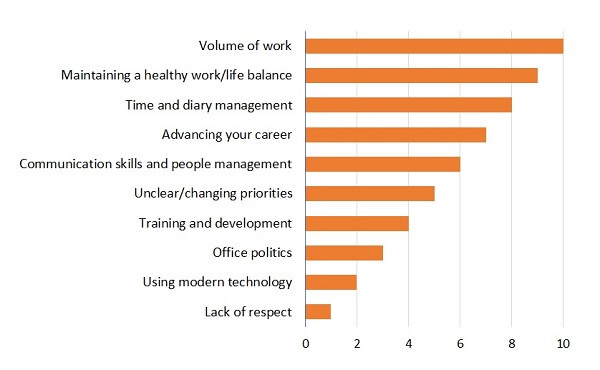Shopping cart
Your cart is empty
£0.00

As part of our 2018 survey, we compiled a list of the ten major challenges PAs encounter on a daily basis. We then asked respondents to rank these on a scale from one (least challenging) to ten (most challenging). Here’s a quick overview of the results and my advice on how to deal with each of those.

Unsurprisingly, this was seen as the main challenge. With many PAs now working for several managers, even day-to-day tasks such as diary and email management can become time-consuming. Any additional tasks or projects (especially when under-resourced and poorly planned) can quickly lead to an unrealistic and unsustainable workload.
Comments from respondents included PAs working longer hours just to keep their heads above water, or being expected to take on work for which they weren’t qualified. We know from talking to delegates on our courses that this is true for many PAs. Other respondents said that employers were unwilling to organise temporary cover for holidays, thinking that PAs can “just catch up”. This is turning a bad situation into an impossible one. If this rings a bell with you, please take action immediately before it has a detrimental effect on your family life and, eventually, your health.
To help tackle the problem, start by speaking to your boss (or bosses) about their upcoming priorities or projects. That way, you can plan further ahead, make sure you are focussing on the important issues, and spot any potential workload clashes. Try setting yourself SMART objectives (Specific, Measurable, Agreed, Relevant Time-bound). These can help you develop your work strategy and to see what you’re achieving. (You may be surprised at the results!) Without clear objectives, it’s easy to find yourself working long hours day after day without any purpose.
This was almost equal in second place with Time and Diary Management as the next biggest challenge. It’s no coincidence that both are related to volume of work.
A healthy work/life balance can be tough to achieve, especially when dealing with enormous workloads and multiple deadlines. One respondent said that the biggest problem was finding a way to switch off from work! Not always easy to do but you need to find a way to protect your “downtime”. If hitting the gym isn’t your thing, you could try yoga, pilates, or tai chi. All require complete focus, and will help you forget about the office for a while.
Many PAs tell us they work through their lunch hour just to catch up or to clear their desk ready for the afternoon’s work. It may seem counter-intuitive, especially when you’re busy, but it’s important to take a proper lunch break. Try to get away from your desk, or away from the office completely if possible. You’ll clear your head, give your mind a break from concentrating all the time, and avoid that mid-afternoon productivity slump.
Try setting yourself a target of leaving work on time at least twice a week. And don’t get into the habit of taking work home. If you have a mobile phone exclusively for work, make sure you agree when this is to be switched on – and off. Otherwise you can find yourself working 24 hours a day.
Learning to leave the office behind is a life skill worth cultivating.
This is a constant challenge for PAs. Juggling and coordinating calendars can be a surprisingly lengthy process. Time management, too, is always an issue. You need to protect not only your boss’s time but also your own.
When you’re interrupted, your brain takes two minutes to re-engage and re-focus on the task in hand! We all know it’s impossible to eliminate interruptions completely so try to minimise these wherever possible.
Close your office door, turn off email notifications, and screen your calls. If possible, try to negotiate specific times during the week when you can be ‘unavailable’. Even as little as 30 minutes will give you that block of time to fully concentrate on your work. You’ll be amazed at how much this will help you.
It’s unclear whether this is due to lack of opportunity or the unwillingness of employers to promote PAs into other roles in the organisation. Whatever the reason, it’s important to have the chance to grow and move forward in your career.
PA training courses, professional qualifications, mentoring programs, and networking groups can all help you progress and develop your skills, whether with your current employer or in another organisation.
Seen as the fifth biggest challenge, this category drew the most comments from our respondents. Handling difficult situations, dealing with people who may be stressed or upset, or working with colleagues who don’t share your viewpoint, all require excellent communications and people skills.
Comments included:
This last comment is interesting. Younger people can have different expectations of work compared to the older generation, seeing the line between home and the office as less defined. This can lead to areas of friction which need careful handling.
This is a skill like any other, and one which can be learned. There are a range of courses on communication and people management skills, as well as books and YouTube videos. These can offer an excellent insight into the problem and offer suggestions for diffusing situations or helping others see different points of view.
This scored only slightly less than the previous three categories. From comments received, this challenge can be caused by a lack of understanding of the PA role (by your boss or others), the absence of clear decision-making, not communicating with the team and/or not offering feedback. Poor planning leads to constantly changing work priorities, causing stress to everyone concerned.
Talk to your manager about their projects and any new work in the pipeline. You both need to be able to see the bigger picture to understand the priorities, thereby allowing you to work far more efficiently and effectively.
Getting the correct training helps you to do your job to the best of your ability – so surely this should be a no-brainer for employers. Unfortunately, budget constraints and lack of resources mean this isn’t always possible. PAs may therefore struggle keep up to date with technology or to find new, more efficient ways of working.
Check to see if your organisation has a training policy, and if necessary, obtain a few quotes from several training companies. Speak to your manager about the skills you would like to develop (IT, minute-taking, communication skills) and the various courses available. By helping your boss understand the value and the benefits it will bring, you’ll start to build a business case for your continued professional development.
Dealing with negative office politics can be difficult, as can trying to ignore it. PAs need to stay out of it as much as possible, while usually being the ones to deal with the fall-out. Egos of senior staff and VIPs, constant negative feedback, and undermining younger, less experienced employees were among the comments. PAs need to draw on their entire armoury of soft skills to navigate a way through this minefield!
There are several books available to help you do just that. “The Secret Handshake” by Kathleen Kelly Reardon is one of the best sellers. It’s a no-nonsense, well-informed guide to modern office politics, and definitely worth reading.
Whilst office technology has certainly changed the way we work for the better, it seems that out of date computers, non-compatible equipment, and lack of effective support mean it has also become a major headache. Organisations may have limited budgets to spend on IT, but sticking with old or obsolete equipment is a false economy, and dealing with constant IT problems is extremely stressful and time-consuming for the whole team.
If this is an issue in your office, you can bet it’s already been raised many times with the department/person concerned! While you’re waiting for that IT upgrade (however long it may be) the best advice is to work with what you’ve got, and make allowances for the printer breaking down, or the email system crashing (again). But do so with good humour, and then if all else fails, you’ll gain a reputation for being “calm in a crisis”!
Finally, despite being rated as tenth, lack of respect is still a definite issue. Several respondents said they felt overlooked due to their job title, with one PA feeling pigeonholed into diary management – and not much else! There is still a lack of understanding (by bosses as well as colleagues) of the PA role, the value they bring to the work of their manager, and the contribution they make to an organisation.
Of course, many managers know exactly how much they depend on their PAs to organise their working lives. A growing number of businesses have come to appreciate their PAs and EAs, and are keen for them to grow and develop within the company. You may even be lucky enough to work in one of these organisations. If you and your manager work well together and respect each other, congratulate yourself on having struck gold. If not, it may be time to start updating your CV …
We realise that these are just a few of the day-to-day challenges in what can be a demanding and stressful job. Despite being a brief survey and proving only a snapshot, the results chime with what we’re hearing from delegates on our courses.
But it’s only part of the picture. In our next article, we’ll look at the main motivating factors for our PAs, proving what a fascinating and exciting role it really is!
PAul Pennant,
MD and Principal Trainer
Today’s PA



Tel.: +44 (0)20 7622 2400
Email: info@todayspa.co.uk
Today's PA
52 The Warwick Building
Chelsea Bridge Wharf
366 Queenstown Road
London
SW11 8NJ
Copyright © 2024 Today's PA. All rights Reserved.
We use cookies, just to track visits to our website, we store no personal details.
ACCEPT COOKIES What are cookies?